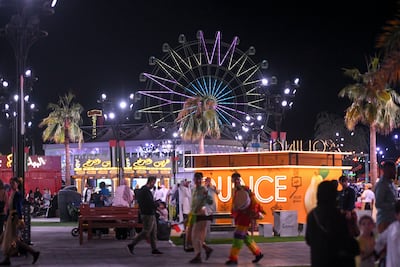UAE consumer spending jumped 13 per cent annually last year as people spent more on retail amid continued economic momentum in the Arab world's second-largest economy.
Retail spending rose 14 per cent annually during the 12-month period, driven by fashion (which grew by 31 per cent year on year), general retail (up 16 per cent), leisure and entertainment (15 per cent) and hypermarkets and supermarkets (3 per cent), Majid Al Futtaim, the Middle East's largest mall operator, said in its annual State of the UAE Retail Economy report on Thursday.
Non-retail spending – such as real estate, fuel, government services, airline tickets, transportation and education – increased by 12 per cent on a yearly basis, the report found.
Spending remained buoyant throughout the year, but specifically stood out in the last quarter, contributing to 27 per cent of total retail economy spend for the year.
The report attributed it to the Cop28 event, which attracted tens of thousands of visitors to the Emirates, in addition to the traditional holiday spend.
Last year, consumers preferred smaller basket sizes while making more shopping trips. They split their buying between in-store and online, looking for the best deals while limiting the number of products purchased on each trip, whether virtual or in-person, the report said.

Average spending fell by 2 per cent per basket while the number of transactions grew by 4 per cent.
Meanwhile, Majid Al Futtaim’s Happiness Lab survey showed a growing appreciation for discount shopping. Almost 47 per cent of respondents preferred purchasing discounted items, while 20 per cent said they would switch to economical brands.
“Over the past 12 months, its [the UAE’s] proven resilience to external pressures, coupled with progressive policy-making and an investor-friendly business environment has seen the UAE further strengthen its position as a lighthouse for the Mena [Middle East and North Africa] region,” Ahmed Ismail, chief executive of Majid Al Futtaim, said.
The report said the Emirates’ economy has remained resilient amid recent geopolitical tensions and economic headwinds, adding to consumer confidence.
The UAE economy is expected to grow by 5 per cent this year, driven by a robust expansion in the non-oil sector and an increase in foreign direct investment, Minister of Economy Abdulla bin Touq said in March.
The non-oil economy currently accounts for 73 per cent of the UAE’s gross domestic product, a “historic first for the country”, he said.
Meanwhile, the UAE Central Bank projects the country's economy to expand 4.2 per cent this year.
Inflation dropped to 3.3 per cent last year from its 2022 high of 5.2 per cent, the Majid Al Futtaim report cited Oxford Economics as saying.
It remained below the global average of 6.9 per cent and considerably lower than the Middle East average of 13.9 per cent.
Oxford Economics forecasts this trend will continue through 2024 with inflation dropping to 2.8 per cent by the end of this year, further stimulating consumer spending.
Surge in e-commerce spending
E-commerce penetration in the UAE has more than doubled since 2019, from 5 per cent to 12 per cent in 2023, with approximately 70 per cent of transactions attributed to mobile phones, the report said.
Last year, e-commerce consumer spending in the UAE's retail sector grew 15 per cent, according to data from Majid Al Futtaim's point of sales.
The nation's Digital Economy Strategy, which aims to double the digital economy's contribution to the GDP by 2032, has also supported online spend.
The leisure and entertainment sector continued to grow with consumer spending rising by 15 per cent last year, with a 33 per cent rise in cinema spending driving more than two thirds of this growth.
Cinema spending was primarily fuelled by high consumer expenditure in the second and third quarters, which accounted for 90 per cent of cinema’s total spend growth.
This period coincided with the release of some top-performing movies globally, including Oppenheimer, Barbie, Mission Impossible: Dead Reckoning, Fast X, The Super Mario Bros Movie and Jawan.
UAE residents are also spending more on travel and entertainment.
Almost 64 per cent of residents are contemplating international travel this year, while 43 per cent intend to go on domestic trips, the report said.
The surge in the country’s travel and tourism sector is in line with the UAE Tourism Strategy 2031, which aims to attract Dh100 billion in tourism investments and accommodate 40 million hotel guests by 2031.

